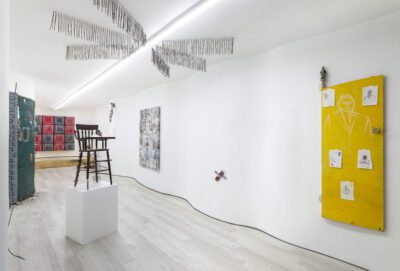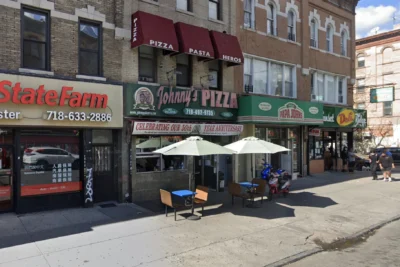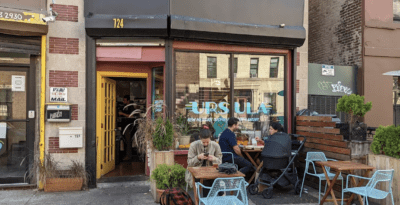DJ Treasure360 spins at Coney Island Reggae On The Boardwalk in 2019, with the full soundsystem in the background (Courtesy of Carter Van P.)
Sound and pressure in Coney Island
New city sound ordinances appear to target long-running permitted Reggae on the Boardwalk events — and the community they serve
On several weekends each summer, Chanter “The Timeless Sound” usually lugs massive speaker boxes from his home in Flatbush to the Coney Island boardwalk. There, he stacks 10 boxes into a 10-foot-tall soundsystem, which blasts reggae music as part of the long-running annual Coney Island Reggae on the Boardwalk DJ event.
“I grew up around reggae music culture,” says Chanter, who was born in Jamaica. “The soundsystem is what makes people recognize reggae music. We didn’t have a Jamaican radio station here when the music was created. People had to listen to a soundsystem — so the soundsystem is a part of the culture of reggae music.”
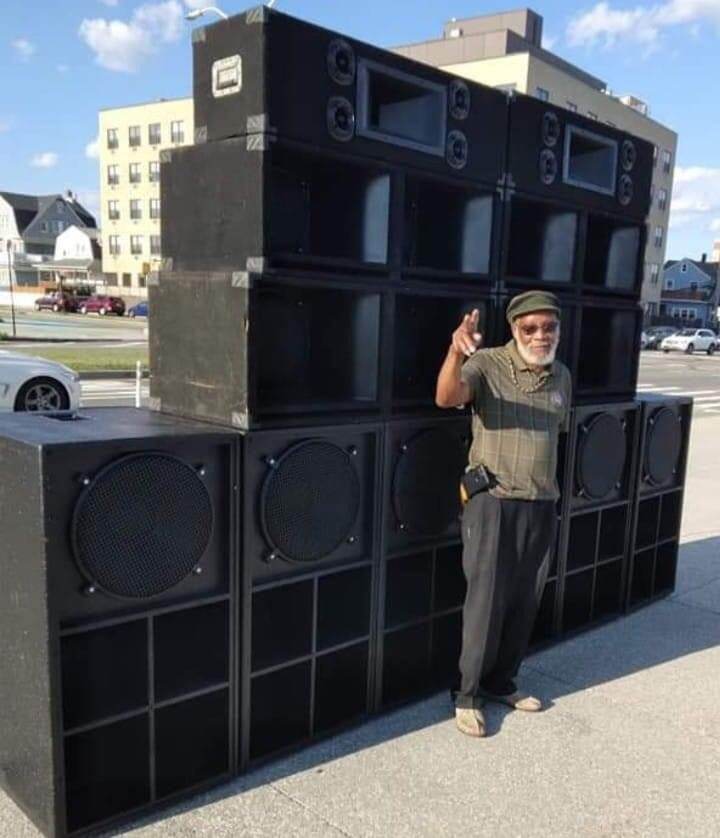
Chanter with his soundsystem, at regular size. (Courtesy of Chanter ‘The Timeless Sound’)
Yet at the first Reggae on the Boardwalk of 2023, on June 4, Chanter brought just two bass speakers and added a Bose home stereo bar, then cordoned them off with caution tape and cones. The party still went on, but the vibe was off.
“It was kind of decent, but it wasn’t what the people was expecting,” Chanter says of the diminished soundsystem. “[Attendees] enjoyed it because they are such loyal supporters — if we had a radio they would support because of the music — but for the most part they didn’t feel it.”
The soundsystem — imposing, bass-heavy and badass-looking — is an important aspect of the dissemination of reggae music (and, by extension, hip-hop) and a big draw for fans and members of the Caribbean diaspora. This year, the soundsystem has come under fire and is the subject of new rules by the New York Parks Department.
Since Memorial Day, the Parks Department has required that permitted events on the Coney Island boardwalk use no more than four speakers to amplify sound. Those speakers cannot be over six feet tall, which, according to Parks officials, includes “ the entire height of a speaker structure, including anything placed underneath it.” The rules apply specifically to Coney Island and not to other Brooklyn parks; obtaining a permit requires compliance with the new laws.
It might sound like a seemingly innocuous if not minute change in rules. But Reggae On The Boardwalk’s organizers — who have obtained permits for the event for 12 years now (this is their thirteenth) — believe height requirements are a direct attack on their event.
“More than anything, Reggae On The Boardwalk appeals to the cultural history of the soundsystem and is an endangered species,” says event founder Carter Van Pelt, a WCKR DJ and curator who works for Queens-based VP Records. “The visual of the speaker boxes is a big part of it.”
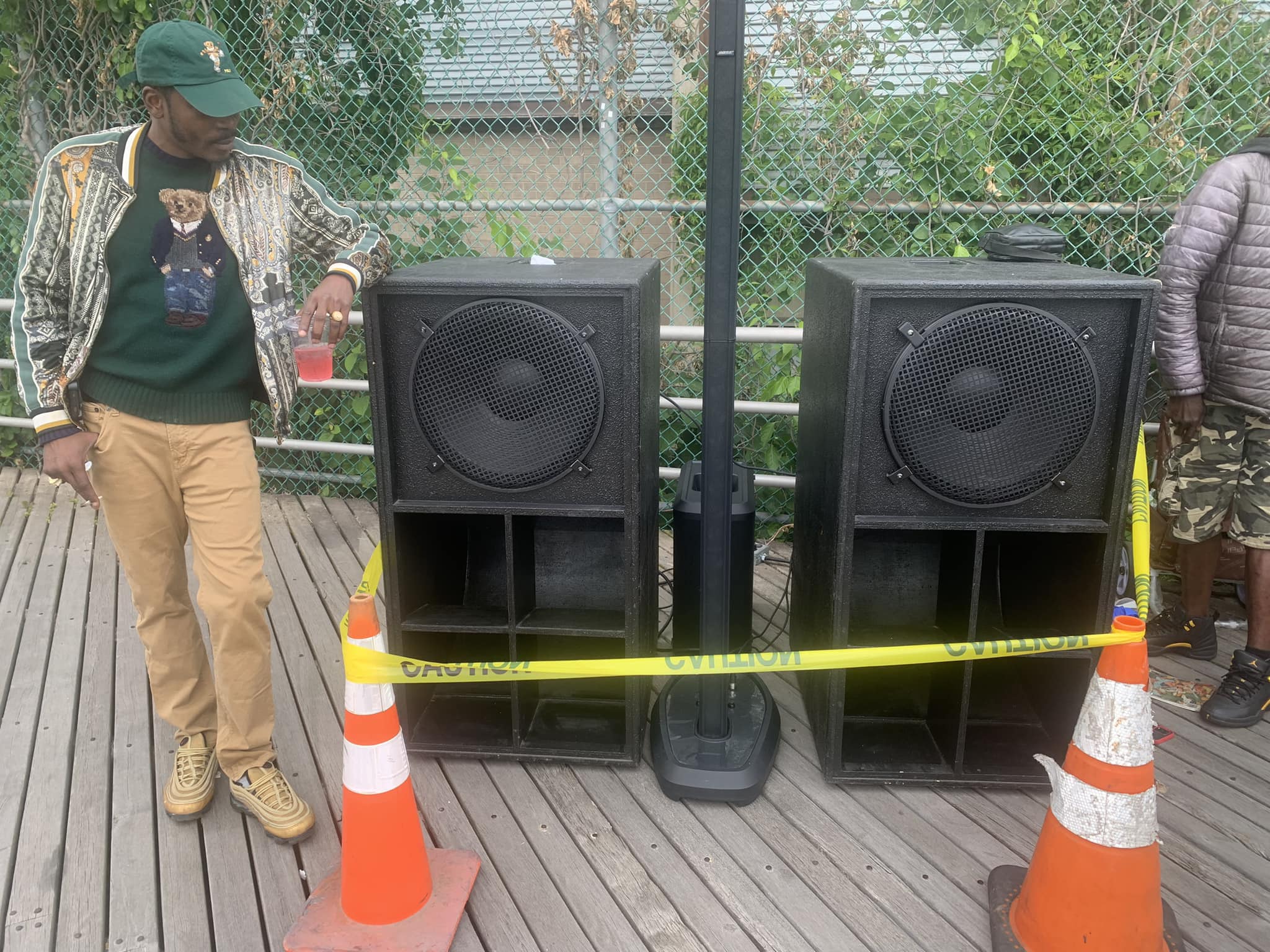

The Reggae On The Boardwalk soundsystem for its June 3 event. (Photo by Jah Son)
Both Van Pelt and Chanter say they have not received answers as to why the height of a soundsystem is an issue. They have hosted permitted Reggae On The Boardwalk events since 2010 and have received multiple grants from the Brooklyn Arts Council.
“I started [the event] at Coney Island because it was a place we could do it and not bother anyone,” Van Pelt says, noting that the Reggae on the Boardwalk has not received any complaints in its 12-year run.
Officials for the Parks Department noted that they aim to “maintain the integrity of the permits process,” but declined to elaborate as to why or how height regulations aid those goals. Spokespeople for the Parks Department also declined to detail existing permitting processes.
“The Coney Island boardwalk is a site with unique characteristics, such as a narrow layout, high levels of pedestrian traffic, and substantial demand from a wide variety of uses,” says Chris Clark, a New York Parks Department press official. “The rules also preserve safe access and egress on the boardwalk and promote quality of life for the many diverse users of Coney Island and the surrounding community.”
The Parks Department and 60th Police Precinct, which issues special events sound permits for Coney Island, did not respond to requests for comment detailing the specific quality of life concerns raised by Reggae on the Boardwalk. The new regulations also adjust the hours in which amplified sound can be used on the boardwalk. Amplified sound permit holders must only operate between 2 and 6 p.m., shifting the window earlier by an hour.
‘I’m not going to risk losing my equipment’
And yet Reggae On The Boardwalk is far from the only amplified event at Coney Island. On any given summer weekend, house music and Latin music DJs, and occasionally a salsa band, set up along the boardwalk. A six-foot-tall speaker — that is, one set atop a stand for optimal listening — is a common height for such events.
“It’s virtually impossible to have any kind of amplified sound that’s less than six feet vertical,” Van Pelt notes.
It is unclear whether those other regular events on the boardwalk are permitted, and thus subject to the new regulations (though Parks notes that “anyone using amplified sound in any city park must first apply for permits from both NYC Parks and NYPD”). Van Pelt, Chanter and other attendees say at least multiple parties occurred on the Boardwalk on June 3 and 4, and at least two were still operating past 7:30 p.m.
Several DJ/organizers who host events or perform on the Boardwalk did not return Brooklyn Magazine’s requests for comment.
What will happen to events, permitted or otherwise, operating outside of the new guidelines remains to be seen. Clark noted that “Parks Enforcement Patrol officers take an educational approach whenever possible as opposed to issuing summons.”
Regardless, Van Pelt and Chanter have chosen to scale down. “We can’t break the rules because I’m not going to risk losing my equipment,” Chanter says.
To Van Pelt, the new regulations feel like an affront without warning or public discussion. He believes his event and others like it, offer “a public benefit to the city,” one that is being swept aside in favor of quality-of-life concerns. Whatever problems do exist, he adds, they had nothing to do with.
“This is particularly egregious given the scope and trend of gentrification in Brooklyn and the size of the Caribbean and Jamaican community in Brooklyn,” he says. “People are celebrating the 50th anniversary of hip-hop, and that wouldn’t happen without the soundsystem.”
Van Pelt shared with Brooklyn Magazine a letter of support from Brooklyn State Senator Kevin S. Parker, who advocated that the new regulations be waived for Reggae On The Boardwalk “due to the event’s enormous importance to its constituents and the cultural life of New York City and its diverse communities.” He continues:
“Sound-system culture, predicated on physically large (but technically inefficient) sound-box style systems, originated in Jamaica and spread through the Caribbean and beyond as a continuum of new music genres emerged in the 1960s. These are now among the world’s most popular forms of music — ska, reggae, dub, and dancehall. Coney Island Reggae On The Boardwalk celebrates and preserves these musical genres of Black origin, treasured by people throughout the Caribbean, Americas, and beyond.”
As of writing, Coney Island Reggae On The Boardwalk has not received a waiver.
Parties with amplified sound will undoubtedly go on as summer sets in, and Reggae On The Boardwalk is set to return on July 2 (additional events will be held on August 6 and September 17 at the K Bridge Park in Brooklyn, a state park which is not subject to city Parks regulations). While Chanter may have fewer boxes to carry to the beach this summer, he’ll have little photographic evidence of what the Timeless Sound looked like in 2023.
“They’re disrespecting the culture,” he says when asked if he had taken any photos with his new in-regulation soundsystem. “Why should I take a picture with that?”
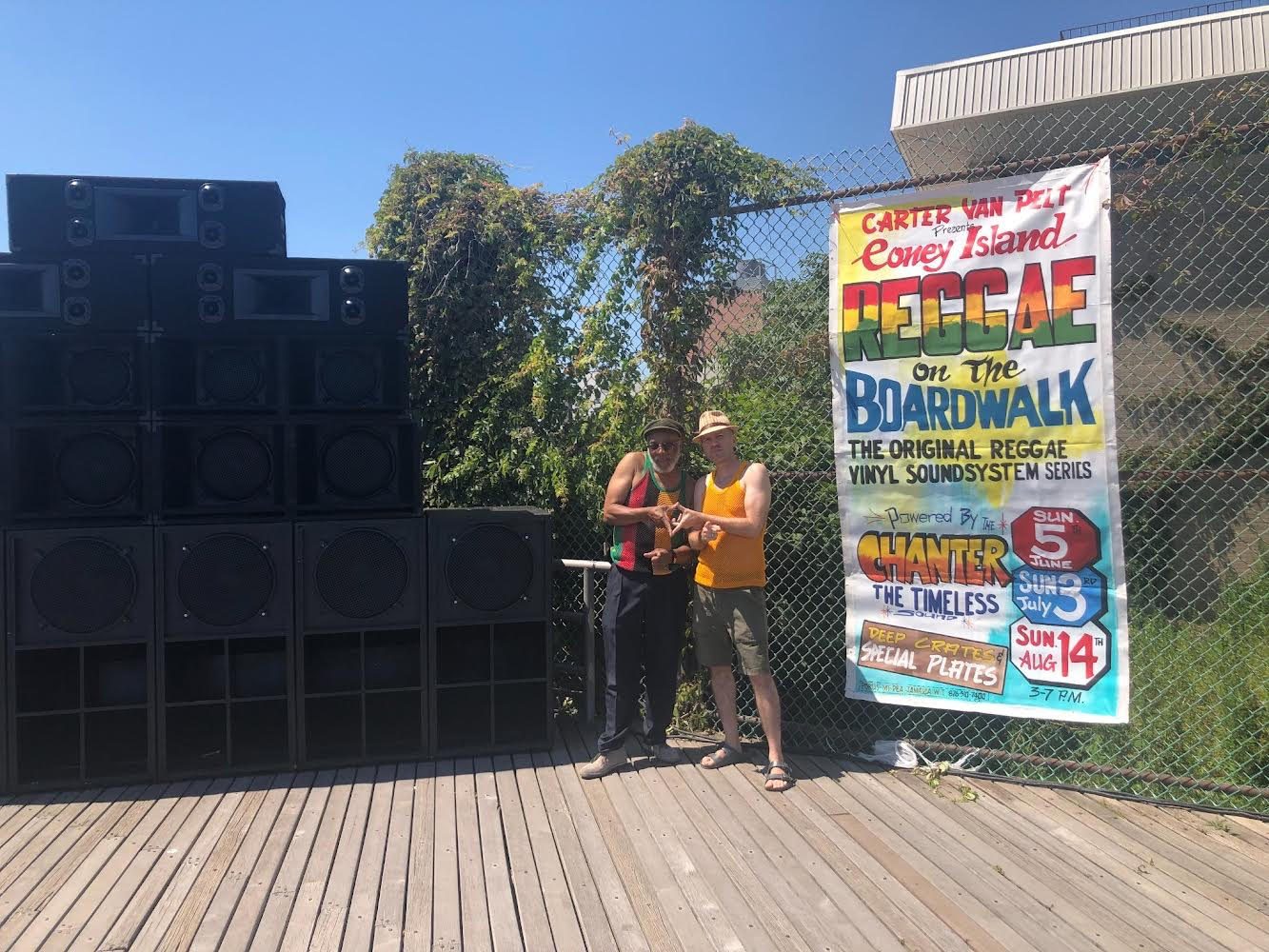

Chanter and Carter Van Pelt in 2022
You might also like 



















